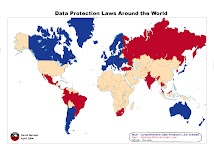We are often asked about data privacy and data protection globally. We hope that the country rankings of Privacy International together with the individual country comments will help answer some of your questions.
...................................
Each year since 1997, the US-based Electronic Privacy Information Center and the UK-based Privacy International have undertaken what has now become the most comprehensive survey of global privacy ever published. The Privacy & Human Rights Report surveys developments in 70 countries, assessing the state of surveillance and privacy protection.
The most recent report published in 2007, available at http://www.privacyinternational.org/phr , is probably the most comprehensive single volume report published in the human rights field. The report runs over 1,100 pages and includes 6,000 footnotes. More than 200 experts from around the world have provided materials and commentary. The participants range from eminent privacy scholars to high-level officials charged with safeguarding constitutional freedoms in their countries. Academics, human rights advocates, journalists and researchers provided reports, insight, documents and advice. In 2006 Privacy International took the decision to use this annual report as the basis for a ranking assessment of the state of privacy in all EU countries together with eleven non-EU benchmark countries (click here for the 2006 results). Follow this link for more details of last year's results.
The new 2007 global rankings extend the survey to 47 countries (from the original 37) and, for the first time, provide an opportunity to assess trends.
Summary of key findings
The 2007 rankings indicate an overall worsening of privacy protection across the world, reflecting an increase in surveillance and a declining performance o privacy safeguards.
Concern over immigration and border control dominated the world agenda in 2007. Countries have moved swiftly to implement database, identity and fingerprinting systems, often without regard to the privacy implications for their own citizens
The 2007 rankings show an increasing trend amongst governments to archive data on the geographic, communications and financial records of all their citizens and residents. This trend leads to the conclusion that all citizens, regardless of legal status, are under suspicion.
The privacy trends have been fueled by the emergence of a profitable surveillance industry dominated by global IT companies and the creation of numerous international treaties that frequently operate outside judicial or democratic processes.
Despite political shifts in the US Congress, surveillance initiatives in the US continue to expand, affecting visitors and citizens alike.
Surveillance initiatives initiated by Brussels have caused a substantial decline in privacy across Europe, eroding protections even in those countries that have shown a traditionally high regard for privacy.
The privacy performance of older democracies in Europe is generally failing, while the performance of newer democracies is becoming generally stronger.
The lowest ranking countries in the survey continue to be Malaysia, Russia and China. The highest-ranking countries in 2007 are Greece, Romania and Canada.
The 2006 leader, Germany, slipped significantly in the 2007 rankings, dropping from 1st to 7th place behind Portugal and Slovenia.
In terms of statutory protections and privacy enforcement, the US is the worst ranking country in the democratic world. In terms of overall privacy protection the United States has performed very poorly, being out-ranked by both India and the Philippines and falling into the "black" category, denoting endemic surveillance.
The worst ranking EU country is the United Kingdom, which again fell into the "black" category along with Russia and Singapore. However for the first time Scotland has been given its own ranking score and performed significantly better than England & Wales.
Argentina scored higher than 18 of the 27 EU countries.
Australia ranks higher than Slovakia but lower than South Africa and New Zealand.
Wednesday, 19 November 2008
Subscribe to:
Post Comments (Atom)




2 comments:
Interesting findings. I would have never thought that Greece would be at the forefront of safeguarding privacy. I wonder if it is all the CCTV cameras that have made the UK score so low.
More cameras in the UK than anywhere else. No wonder I am getting paranoid.
Post a Comment